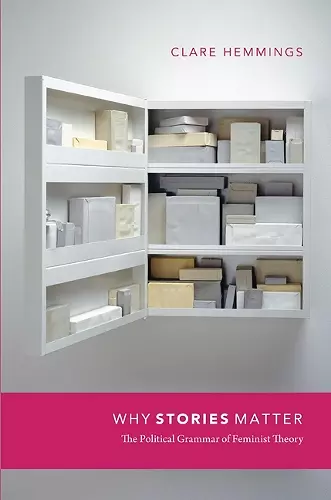Why Stories Matter
The Political Grammar of Feminist Theory
Format:Hardback
Publisher:Duke University Press
Published:18th Jan '11
Currently unavailable, and unfortunately no date known when it will be back

Why Stories Matter is a powerful critique of the stories that feminists tell about the past four decades of Western feminist theory. Clare Hemmings examines the narratives that make up feminist accounts of recent feminist history, highlights the ethical and political dilemmas raised by these narratives, and offers innovative strategies for transforming them. Drawing on her in-depth analysis of feminist journals, such as Signs, Feminist Review, and Feminist Theory, Hemmings argues that feminists portray the development of Western feminism through narratives of progress, loss, and return. Whether celebrating the move beyond unity or identity, lamenting the demise of a feminist political agenda, or proposing a return to a feminist vision from the past, by advancing these narratives feminists construct a mobile “political grammar” too easily adapted for postfeminist agendas. Hemmings insists that it is not enough for feminist theorists to lament what is most often perceived as the co-optation of feminism in global arenas. They must pay attention to the amenability of their own stories, narrative constructs, and grammatical forms to broader discursive uses of gender and feminism if history is not simply to repeat itself. Since citation practices and the mobilization of affect are central to how the narratives of progress, loss, and return persuade readers to suspend disbelief, they are also potential keys to telling the story of feminism’s past, present, and future differently.
“Why Stories Matter is an exciting and impressive book, one that cannot fail to have an impact on the feminist academic community. Clare Hemmings contributes to radical new understandings of feminist theory by brilliantly synthesizing the debates that currently animate the field, and then intervening in ways that force the rethinking of accepted wisdom.”—Rosi Braidotti, Director, Centre for the Humanities, Utrecht University
“I read Why Stories Matter with pleasure; it manages to specify and scrutinize much of what I too find dissatisfying, exasperating, and even enraging about contemporary conversations in academic feminism.”—Eva Cherniavsky, author of Incorporations: Race, Nation, and the Body Politics of Capital
“Whatever happens to Anglo-European feminist theory and politics in the future, the way we look at its past will never be the same again. This extraordinary book identifies the revolutionary elements of a truly global feminist sensibility so urgently required in the present: accountability, reflexivity, and an ability to grasp the intersections between different forms of inequality and power.”—Vron Ware, co-author of Out of Whiteness: Color, Politics, and Culture
“Why Stories Matter animates the field of feminist intellectual historiography. Hemmings provides a comprehensive and incisive approach that describes, critiques, and transforms the stories feminist scholars tell about their past. . . . Hemmings reminds us why our stories about the past of feminist scholarship have political and ethical prescience and, thus, why they matter.” -- Kelly Coogan-Gehr * Signs *
“Hemmings’s book is an extraordinary encapsulation of major trends in recent feminist thought and is sweeping without being glossing, specific without getting mired in detail. Her contributions include not only exposing metanarratives that drive political investments without our noticing but also suggesting that feminists can gain more control over how feminism circulates by attending to this politicoemotional grammar.” -- Naomi Greyser * Feminist Studies *
“Clare Hemmings’s Why Stories Matter is poised to prompt a major rethinking of feminist theory, and more importantly, of how we construct our histories of this field – and what this says about feminists’ intellectual investments and our futures. This is an engagingly written and highly original close reading of theoretical debates in the pages of top feminist journals. . . . The result is a stimulating book, one that has the power to interrogate the reader’s theoretical commitments, the stories she tells herself about her field, and the stories she tells others, including, if she teaches, her students.” -- Ilya Parkins * Reviews in Cultural Theory *
“Hemmings’ interventions do more than constitute a meta-critique of Western feminism; they historicize and provincialize Western feminism with implications on how gender, sexuality and feminism are understood and taken up in a variety of trans/national contexts. This book is compulsory reading for anyone interested in feminism today; not just in Anglo-American feminism or in feminist theory, however, demarcated.” -- Srila Roy * Feminist Review *
“This excellent, original book identifies and critiques the stories feminists tell about feminism. . . . Hemmings’s practice of detaching scholars’ names from their writing is inspired, because it moves away from praising or vilifying individual authors in favor of looking at prevailing narrative patterns. . . . Highly recommended. All readers.” -- R. R. Warhol * Choice *
“... Hemmings is convincing in her mapping and unpacking of the recurring narratives, and argues persuasively that feminist scholars must take their roles as storytellers seriously... Hemming’s passionate and erudite book should be embraced....” -- Fiona Philip * Parallax *
"Hemmings’s feminist narratives ... point to the potential of a feminist political grammar genuinely capable of promoting the kind of global social change so urgently needed." -- Karen J. Leader * Storytelling, Self, Society *
ISBN: 9780822348931
Dimensions: unknown
Weight: 558g
288 pages